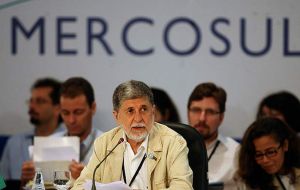MercoPress. South Atlantic News Agency
Mercosur unable to agree on double tariff system
 Celso Amorim during the opening session
Celso Amorim during the opening session Poor start for the Mercosur summit in Salvador Bahía, Brazil. Mercosur member countries have been unable to reach an agreement in one of the main points of the agenda and which has been a stumbling issue for years: elimination of the double tariff on imports from third countries and which are then re-exported inside the block.
At the opening session Monday of the Common Market Council, Brazilian Foreign Affairs minister Celso Amorim said he was disappointed because Argentina, Brazil, Paraguay and Uruguay technical groups had failed to reach a consensus on the double tariff system. "This will bring consequences: it's not only something which we should have left behind long time ago, it will make negotiations with other groups difficult, particularly with the European Union", said Amorim. The Brazilian minister presided over the Common Market Council deliberations which bring together Mercosur ministers of Economy, Foreign Affairs and central bank authorities. "We have always accepted that this issue would become a hurdle for negotiations with other countries or economic blocks. The moment we move from negotiations on trade preferences to free market negotiations, we run into the difficulties of not having eliminated this issue", he added. Double tariff is the act of levying products imported to any country member of the block and again when the product goes to some other member country, "which contradicts the principle of free trade inside the block and makes imports landed in a port of another Mercosur country that much dearer". The issue is particularly sensitive for Paraguay which since landlocked has no sea access and makes most of its imports through Argentina and Brazil. "A great effort was done but we didn't manage to achieve it", said Amorim who nevertheless rounded up a full day of deliberations as favourable for other negotiations and anticipated several agreements to be announced Tuesday by Mercosur presidents. Tuesday also promises to be a hectic day because Brazil will be hosting besides the Mercosur presidential summit, a special conference of all Latinamerica and Caribbean countries, 33 in total, (including Guyana, Surinam, Cuba, Mexico and Panama) to consider cooperation in addressing the global financial, energy and food crisis plus the consequences of climate change. The conference is also expected to address integration as an essential tool to help strengthen "different regional initiatives on the matter", according to the official release from the Brazilian Ministry of Foreign Affairs. The region has been particularly hit by the fall in commodity prices which has fuelled strong growth for the last five years. Soaring prices for energy and food have also become a serious challenge. The meeting reflects the "strong conviction that regional dialogue and cooperation are vital for a better insertion of the region in the international system", underscores the release, adding that "dialogue between heads of state and government represents a unique opportunity to advance with a common agenda". The Salvador Bahia meeting will also host a meeting of the Union of South American Nations, Unasur, which has two thorny issues to address: naming a secretary general and a special report on peasants' killings during the recent revolt in Bolivia. The region's main political consulting body, the Group of Rio will celebrate the incorporation of Cuba as a member which will also open the door to Cuban president Raul Castro to regional summits.




Top Comments
Disclaimer & comment rulesCommenting for this story is now closed.
If you have a Facebook account, become a fan and comment on our Facebook Page!